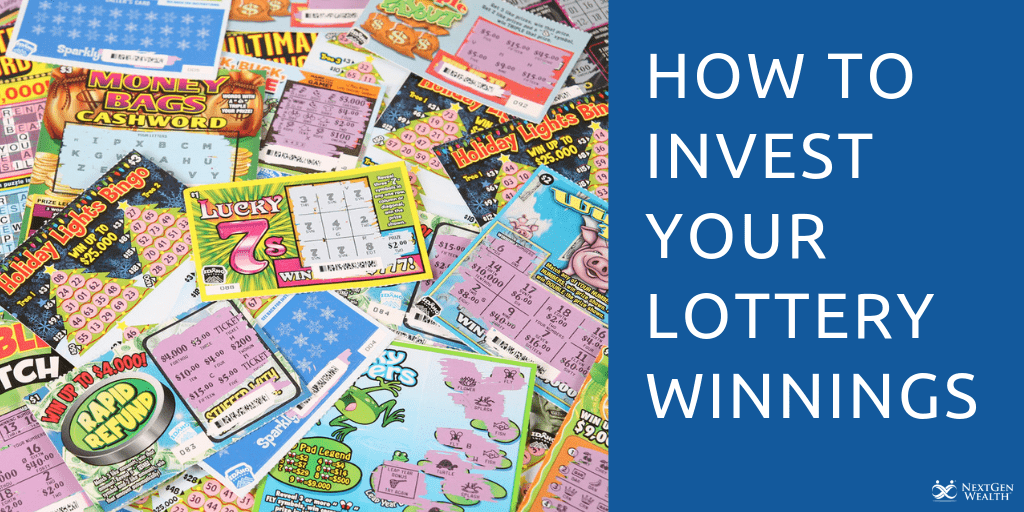How to Invest Your Lottery Winnings (or any large sum of money)
This post was last updated on January 20, 2021, to reflect all updated information and best serve your needs.
This article WILL NOT teach you how to win the lottery. However, it will teach you how to invest any large lump-sum of money that you come into unexpectedly. if you're looking for lottery get-rich-quick schemes, this is not the right article for you.
Winning the lottery or coming into a large sum of money can change your life in more ways than one. You’ve probably read about people who have won the lottery and then went broke. With proper planning, you can avoid their fate. Today, we’re going to show you how to invest your lottery winnings or, for that matter, any large lump sum of money that happens to come your way.
It’s not every day that you find yourself in such a position. While you may want to run out and buy everything your heart desires, this is not the best course. If you take the necessary steps to get your finances in order, you can beat the odds and avoid squandering your windfall.
After celebrating with family and friends, it’s time to get down to the business of your finances. But what should you do next? Below is a plan that will help you manage how to preserve and grow your lottery winnings (or any lump-sum), while still being able to enjoy it at the same time.
Do Your Research
With so much information out there, it can be difficult to know where to start. And once word gets out about your good fortune, family, friends, and distant acquaintances might start coming out of the woodwork.
When people find out you've come into some money, they may want in on the action. It’s human nature. To that end, you’ll likely start getting asked to invest in someone’s business venture or fund someone else’s startup...and who knows what else.
While you can set a small percentage of your winnings aside to help family and friends, beware of those who will take advantage of you and your money. Put a cap on how much you’re willing to give so you don’t end up draining your fortune quickly as so many others have done before you.
Even the largest of windfalls can quickly dwindle down if mismanaged. This is why it’s important to call a financial timeout for a few months after you come into your money. Do nothing with the funds and instead focus on creating a plan.
There are going to be many different ways you can spend your money. Take a step back and figure out a plan that makes the most sense for you and your family. Educate yourself on the potential tax implications and shelters so you have a better idea of what you’ll be facing come tax time.
Consider Talking with a Financial Advisor
One of the best things you can do when you come into a large sum of money is to assemble a team of advisors. No one person can know everything so finding people who specialize in all of the different aspects of wealth management is important.
The first person you should consult is a qualified financial advisor. This person can help you navigate all the challenges of your increased net worth. Talk to a few financial advisors to find the person that’s the right fit for you and your individual situation.
When interviewing potential financial advisors, look for someone who’s objective and experienced. You need to find a person you trust with your finances that isn't looking to make a quick buck.
The person you select for the advisor role can help you determine the best way to receive, invest and plan for your lump-sum. Most lottery winners have the option of receiving their money as a lump sum payout or in the form of an annuity.
Advice from a financial advisor and a tax professional will be key in helping you navigate the world of high-income individuals. They can help you decide if it makes sense to quit your job and how much you’ll have left after taxes for saving, spending, and investing.
Learning how to handle your windfall can turn into a full-time job. There’s a lot to learn about taxes and tax laws, managing your finances, as well as ways to protect yourself and your assets. Once you find a financial advisor that’s a good fit, that person can recommend other professionals that can be a part of your team.
Consult with an Estate Planning Attorney
After finding a financial advisor, your next step should be to engage an estate planning attorney. Now that you've come into some money, it now becomes part of your estate.
An attorney who specializes in this kind of planning will help you figure out the gifting and inheritance laws that you will be subject to when sharing your good fortune. They can also help you put together a trust and will and work out a plan for philanthropy if you’d like to make donations.
Certain provisions in tax laws allow you to exclude some of your assets from your estate for the purposes of calculating the federal estate tax. States differ on exclusion amounts and tax rates. In fact, some states don’t have an estate tax.
Before doing any estate planning, it’s important to talk to a qualified attorney. They can help you consider the potential tax consequences to your beneficiaries, advise you on setting up a trust, if necessary, and so on.
First Things First: Get Your Finances in Order
Once you have your team assembled, including a financial advisor, tax professional/CPA , and an attorney, it’s time to get to work. While your team will help you put together a plan for your money, below are a few things to consider.
Getting your finances in order will help you figure out where you stand.
Pay Off Debt
One of your first orders of business before buying a fancy new car or a new wardrobe should be to pay off your debts. Sit down and make a list of all of the money you owe: credit card debt, mortgage, car loans, etc.
Call up each of your lenders and get a final payoff balance. This is the full amount you’ll need to pay to satisfy your debt. Go down your list and pay each and every one of your creditors. Do this until you don’t owe anyone any more money.
You may not realize how much owing money affects you. Paying off all of your debts means starting fresh. Once that’s done, you know that all the money in your account is yours to spend as you’d like. It’s a clean financial slate.
If you’ve never been debt-free before, it can be a strange feeling knowing you don’t have any more debt payments. It’s a great feeling so take some time to enjoy it.
Top Off Your Emergency Fund
Now that you don’t have any more debt, you'll want to top off your emergency fund. This money should be easy to access and highly liquid. Since the funds are earmarked for an emergency, you should be able to access them quickly and easily. Typically, 3-6 months of expenses is what you should have in your emergency fund.
If you don’t have an emergency fund and don’t know what that is, let’s take a step back. Basically, an emergency fund is money that you set aside to help you cover unexpected expenses that are not covered in your regular budget.
Expenses like your car breaking down, blowing a tire, an unexpected high medical bill, and so on. Those are emergencies and having some money set aside to cover them will go a long way toward keeping you out of debt.
Even if you now have a large sum of money available, chances are it won’t be just sitting in a bank account. At least it shouldn’t be but more on that later. It’s important to have access to some liquid assets such as cash at all times.
With your new higher net worth, you should up the size of your emergency fund to account for the increase in spending. Consult with a qualified financial advisor for a recommendation on the size of your new cash cushion.
Retirement Funds
Once you have your debts paid off and your emergency fund in place, your next stop should be your retirement accounts. Putting money in your retirement accounts is a great tax shelter. It’ll also offer a cushion down the road as you cross the retirement age threshold.
Don’t let the large windfall color your perception of the future. While you may think you’re all set for the rest of your life, including your golden years, you may end up with less cash than you planned.
The money in your retirement accounts is a hedge against what the future may bring. Since they can’t be accessed easily, without paying a penalty, your retirement savings will continue to grow.
And if you end up not needing them down the road, your financial advisor, as well as your attorney, can help you make plans for incorporating them into your estate plan.
College Savings Accounts
If you have kids, consider setting aside some of your windfall in a college savings account. This will help them cover their higher education costs without going into debt. There could be some tax advantages for you as well. Consult with a qualified tax professional on the best way to fund your children’s future education expenses.
There are some restrictions on what college savings vehicles you can use depending on your assets. This is why it’s important to talk with someone who works with high-net-worth individuals and is familiar with the best savings vehicles for this type of expense.
Just like with your retirement savings, college funds generally have an early withdrawal penalty. There is also a penalty for using the funds for non-qualified expenses. Talk through all of the pros and cons of each option with your advisory team before making a decision.
Set Investment Goals
Now that you have all of the basics covered, it’s time to think about your long-term goals for your money. This will help you come up with a plan for how to save and invest the funds, so you don’t find yourself broke a few years down the road like so many lottery winners do.
Once you have a clear picture of how much money you now have, it’s time to allocate your winnings into several different buckets. For example, you can earmark some of the funds for helping family and friends, for investing in the stock market, buying a property, making a fun purchase such as a boat, etc.
Make sure your buckets line up with your priorities. Consider things like what financial support you want to provide to your family as well as who you consider part of your family. Talk about what you want to do moving forward – keep working, retire, start a business, etc. Discuss your risk tolerance, your hobbies, and interests, and so on.
Based on your priorities and what you envision for your future, work on a plan with your financial advisor on the best way to invest your lottery winnings. It’s important to diversify your investments, monitor them regularly to check alignment with your goals, and rebalance as necessary.
Lump-Sum Investing vs. Dollar Cost Averaging
When it comes to investing your lottery winnings into the stock market, you have two options – put all of your cash to work immediately or periodically invest portions (called dollar-cost averaging).
How you proceed with investing your lottery winnings will depend on your risk tolerance as well as your long-term plan. Don’t base your decision on the current state of the economy or the wild swings of the stock market.
If you have a long investment horizon (for example 25 years), then it may make sense to put a lump sum into the market all at once. You should have a good idea of what the return will be over a long-period of time if you're in a well-diversified portfolio. In addition, the money won’t be languishing in a money market/savings account, earning subpar returns.
On the other hand, in some cases, dollar-cost averaging can help you take advantage of the stock market swings. If you have a lower risk tolerance, investing your funds over a period of time can minimize losses and maximize future returns.
The Bottom Line
If you’ve won the lottery or come into a large sum of money, it’s up to you to decide how best to invest, save, and spend your lottery winnings. Making the right financial decisions can help you ensure that you continue to enjoy the cash for many years down the road.
Don’t let your emotions cause you to make financial decisions you will regret. Before you make any big moves, assemble a team of qualified professionals to help you make informed choices with your money. First and foremost, focus on building a solid financial foundation that will support your long-term goals.



